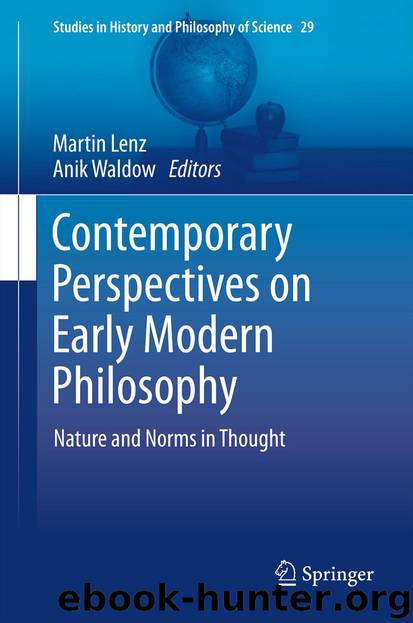Contemporary Perspectives on Early Modern Philosophy by Martin Lenz & Anik Waldow

Author:Martin Lenz & Anik Waldow
Language: eng
Format: epub
Publisher: Springer Netherlands, Dordrecht
7.6 Herder
This is the direction that Herder takes. Reason is not simply assimilated to sensibility. It becomes subjected to an empirical, comparative form of treatment which actually emphasizes its distinctive characteristics.
Wolff had distinguished “rational” from “empirical” psychology, and the latter plays a key role in Herder’s strategy. It worked on analysis of the behaviour of others and on analysis of our own psychological states, and he writes that it “is really a history of the soul and can be known without any other discipline.”16 Empirical psychology provided the raw materials for rational psychology, in that the task of rational psychology was to derive the results of empirical psychology from a priori first principles, with a view to achieving clarity and distinctness. This kind of move from empirical to rational psychology was a form of subsumption of the former under the latter. At the same time, however, for Wolff and Baumgarten there is a continuum between the higher and lower faculties, between understanding and sensibility.17 This opens up the possibility of another form of enquiry, one in which the aim is to explore the relation between the faculties as placed along the continuum. This latter would be a form of “history” in Wolff’s terms, “natural history” in Hume’s terms. In itself, it would not rule out the project of subsuming sensibility under reason, but if one had independent objections to such a project – objections which were plentiful from the 1750s – then it would provide a potentially promising route. What, in Wolffian terms, were the lower faculties would now be reassessed, being called upon to provide the model for analysis of the higher ones. It was a matter of using the resources employed to explore sensibility, resources that were highly naturalized, to explore the understanding.
The enquiry now becomes empirical, not speculative, quite different from the facultative logic that the Wolffian tradition takes over from Leibniz as the route to clarification of ideas. I want to distinguish two sets of resources that help Herder to follow the empirical path. The first is something that he takes over from developments in the life sciences, and more broadly in matter theory. It offers a picture of natural philosophy which makes possible an understanding of living things, which the earlier mechanist model had unsuccessfully tried to account for in reductive terms. A new theory of matter construes it as active, not inert, and it introduces developmental considerations into natural history in a fundamental way. The second is an extension of naturalizing resources to include language, so that it is no longer merely a means of expression of thoughts, but something that goes to the heart of what it is to think. Analyzing thought through language offers a potential avenue for naturalization not available if language is simply a means of expression which has no content in its own right.
Let us consider the natural-philosophical question first. Sensibility could hardly act as a model of naturalization if it itself could not be naturalized. If sensation and
Download
This site does not store any files on its server. We only index and link to content provided by other sites. Please contact the content providers to delete copyright contents if any and email us, we'll remove relevant links or contents immediately.
| Anthropology | Archaeology |
| Philosophy | Politics & Government |
| Social Sciences | Sociology |
| Women's Studies |
The remains of the day by Kazuo Ishiguro(8943)
Tools of Titans by Timothy Ferriss(8345)
Giovanni's Room by James Baldwin(7293)
The Black Swan by Nassim Nicholas Taleb(7085)
Inner Engineering: A Yogi's Guide to Joy by Sadhguru(6775)
The Way of Zen by Alan W. Watts(6574)
Asking the Right Questions: A Guide to Critical Thinking by M. Neil Browne & Stuart M. Keeley(5734)
The Power of Now: A Guide to Spiritual Enlightenment by Eckhart Tolle(5719)
The Six Wives Of Henry VIII (WOMEN IN HISTORY) by Fraser Antonia(5482)
Astrophysics for People in a Hurry by Neil DeGrasse Tyson(5168)
Housekeeping by Marilynne Robinson(4418)
12 Rules for Life by Jordan B. Peterson(4291)
Double Down (Diary of a Wimpy Kid Book 11) by Jeff Kinney(4252)
The Ethical Slut by Janet W. Hardy(4232)
Skin in the Game by Nassim Nicholas Taleb(4223)
Ikigai by Héctor García & Francesc Miralles(4212)
The Art of Happiness by The Dalai Lama(4114)
Skin in the Game: Hidden Asymmetries in Daily Life by Nassim Nicholas Taleb(3972)
Walking by Henry David Thoreau(3937)
